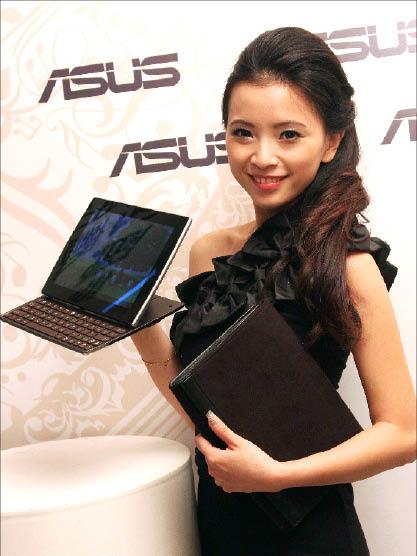Asustek Computer Inc (華碩), the world’s No. 5 PC brand, yesterday said its upcoming UX series Ultrabook platform would fail to carry price tags of less than US$1,000, as claimed by Intel Corp.
“Unless we use Intel Core i3 chips [the Ultrabooks will not be less than US$1,000]. The price tags will have to go beyond US$1,000 if [more advanced] i5 and i7 chips go into the notebooks,” a person familiar with UX development said.
The UX series will mainly use i5 and i7 to boost performance, he said.

Photo Courtsey of ASUS
The i5 and i7 chips, which are more expensive, plus the operating system and solid-state hard drives would account for about 50 percent of the cost of the ultraslim notebooks, thus driving up the price of the UX series to between US$1,000 and US$2,000, he said.
The UX series, showcased by Asustek at the Computex tech trade fair in late May, aims to rival MacBook Air from Apple Inc.
The UX series has two models — one is 11.6 inches and weighs 1.1kg, while the other is 13.3 inches and weighs 1.3kg.
Intel touted the Ultrabook platform at Computex, saying it would make notebooks thinner, lighter and more affordable, with price tags of less than US$1,000, while adding that battery life would last longer than 10 hours.
Asustek is likely to be the first vendor to debut Ultrabooks. The person said it was on track for a debut in Taiwan in late September.
Other companies, such as Acer Inc (宏碁) and Hewlett-Packard Co, reportedly plan to roll out Ultrabooks by the end of the year.
The person’s comments echoed those of Asustek general sales manager Kevin Lin (林福能), who said earlier this month that the price tags for the UX series would go above US$1,000 based on various specs.
Daiwa Capital Market’s analyst Calvin Huang (黃文堯) said on July 13 that Intel was merely cutting prices for its low-voltage processors to help thin and light notebooks make a comeback.
However, in Huang’s view, Intel’s help might not be enough because to make an Ultrabook, other more advanced and expensive components — such as ultrathin panels, solid-state hard drives, metal casings, high-density interconnect and polymer batteries — are required to make it comparable to the MacBook Air.
Separately, Fitch Ratings yesterday upgraded Asustek’s long-term foreign currency issuer default rating to “BBB” from “BB+” and its national long-term rating to “A+(twn)” from “A-(twn),” with a stable outlook.
“The upgrade reflects Asustek’s increase in market share and significant improvements to its -financial profile. The company’s focus on quality and innovation is gradually translating into market share gains and growing customer loyalty,” Fitch analyst Kevin Chang (張崇人) said in an e-mailed statement.
Asustek, which pioneered the mini-size notebook PC — also known as a netbook — market in 2009, is also the world’s largest provider of PC motherboards and graphic cards.

‘SWASTICAR’: Tesla CEO Elon Musk’s close association with Donald Trump has prompted opponents to brand him a ‘Nazi’ and resulted in a dramatic drop in sales Demonstrators descended on Tesla Inc dealerships across the US, and in Europe and Canada on Saturday to protest company chief Elon Musk, who has amassed extraordinary power as a top adviser to US President Donald Trump. Waving signs with messages such as “Musk is stealing our money” and “Reclaim our country,” the protests largely took place peacefully following fiery episodes of vandalism on Tesla vehicles, dealerships and other facilities in recent weeks that US officials have denounced as terrorism. Hundreds rallied on Saturday outside the Tesla dealership in Manhattan. Some blasted Musk, the world’s richest man, while others demanded the shuttering of his

ADVERSARIES: The new list includes 11 entities in China and one in Taiwan, which is a local branch of Chinese cloud computing firm Inspur Group The US added dozens of entities to a trade blacklist on Tuesday, the US Department of Commerce said, in part to disrupt Beijing’s artificial intelligence (AI) and advanced computing capabilities. The action affects 80 entities from countries including China, the United Arab Emirates and Iran, with the commerce department citing their “activities contrary to US national security and foreign policy.” Those added to the “entity list” are restricted from obtaining US items and technologies without government authorization. “We will not allow adversaries to exploit American technology to bolster their own militaries and threaten American lives,” US Secretary of Commerce Howard Lutnick said. The entities

Minister of Finance Chuang Tsui-yun (莊翠雲) yesterday told lawmakers that she “would not speculate,” but a “response plan” has been prepared in case Taiwan is targeted by US President Donald Trump’s reciprocal tariffs, which are to be announced on Wednesday next week. The Trump administration, including US Secretary of the Treasury Scott Bessent, has said that much of the proposed reciprocal tariffs would focus on the 15 countries that have the highest trade surpluses with the US. Bessent has referred to those countries as the “dirty 15,” but has not named them. Last year, Taiwan’s US$73.9 billion trade surplus with the US

Prices of gasoline and diesel products at domestic gas stations are to fall NT$0.2 and NT$0.1 per liter respectively this week, even though international crude oil prices rose last week, CPC Corp, Taiwan (台灣中油) and Formosa Petrochemical Corp (台塑石化) said yesterday. International crude oil prices continued rising last week, as the US Energy Information Administration reported a larger-than-expected drop in US commercial crude oil inventories, CPC said in a statement. Based on the company’s floating oil price formula, the cost of crude oil rose 2.38 percent last week from a week earlier, it said. News that US President Donald Trump plans a “secondary